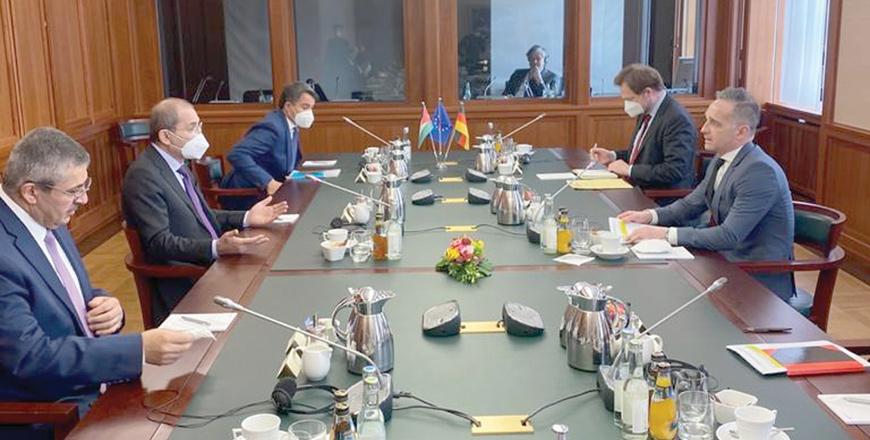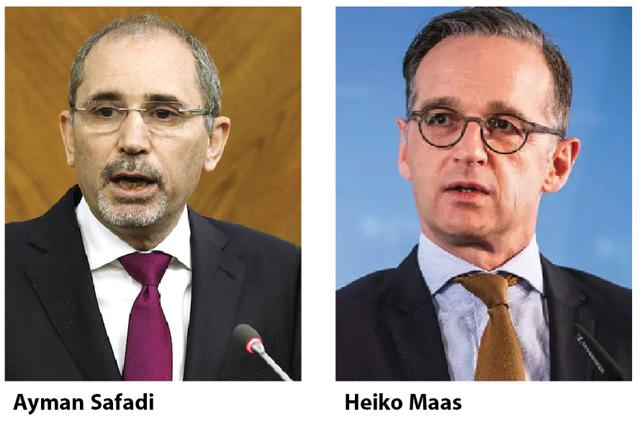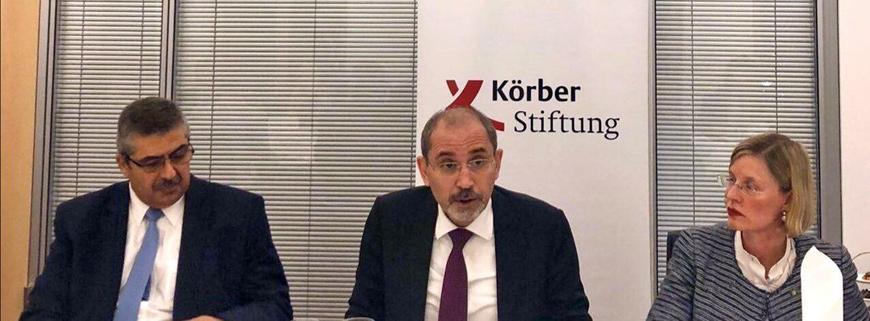You are here
FM, Germany’s Maas hold expanded talks in Berlin
By JT - Mar 10,2021 - Last updated at Mar 10,2021

Deputy Prime Minister and Foreign Minister Ayman Safadi holds talks with German Foreign Minister Heiko Maas in Berlin on Wednesday (Photo courtesy of Foreign Ministry)
AMMAN — Deputy Prime Minister and Foreign Minister Ayman Safadi and German Foreign Minister Heiko Maas on Wednesday in Berlin held expanded talks that mainly focused on enhancing the growing cooperation between the two countries in the economic, development, investment and defence fields.
The two ministers followed up on the outcomes of the virtual meeting between His Majesty King Abdullah and German Chancellor Angela Merkel on February 9 regarding boosting cooperation in facing the COVID-19 pandemic and its repercussions, as well as coordination on regional challenges, according to a Foreign Ministry statement.
Safadi and Maas also highlighted the importance of the strategic ties between the two friendly countries and going on with further enhancing them, where Safadi commended the German support to help the Kingdom move forward in the development process and counter economic challenges.
The two ministers, who are scheduled to take part in the Munich Group meeting on Thursday in Paris with the participation of Egyptian and French foreign ministers, reviewed the latest developments in the Palestinian issue and endeavours to re-launch “serious” negotiations to realise a permanent and fair peace.
During a joint press conference following the bilateral talks, Safadi voiced happiness for being in Berlin to continue “strategic dialogue” on the “strong ties” between the Kingdom and Germany.
The Jordanian-German dialogue is ongoing, as there are several calls between His Majesty and Chancellor Merkel and at the level of foreign ministers, Safadi said, adding that all these calls focus on enhancing coordination towards the common goal of solving regional crises and realising security and stability.
The deputy prime minister stressed that Germany is a main partner and plays a big role at the bilateral level and through the EU, praising Berlin’s efforts towards helping Amman face economic and security challenges resulting from regional circumstances.
Germany plays a pivotal role in the joint effort aimed at resolving regional crises, being them the Palestinian issue, which is the core, the Syrian crisis or other crises, he said.
Safadi expressed appreciation of his German counterpart over the support of Berlin to help Amman face the COVID-19 pandemic and its repercussions, noting that this is a joint global challenge that cannot be overcome but through cooperation.
In this regard, he said that German assistance to Jordan has greatly contributed to providing healthcare to citizens, non-citizens and refugees, voicing aspiration to realise more cooperation to deliver vaccines to citizens and support Jordan’s efforts in providing healthcare to refugees.
The minister also noted that Jordan was the first country to provide vaccines to refugees, which reflects the Kingdom’s commitment to providing all support possible to refugees in all walks of life.
Regionally, Safadi said the Palestinian issue was at the top of discussions, especially that it is the core of conflict and the key to the solution, where efforts have to be intensified through finding a political solution that “retrieves effective negotiations towards the sole solution of the conflict, which is the two-state solution that is based on international law and legitimacy”, according to the statement.
He also said that refugees’ issue is an international responsibility, where host countries cannot be left alone in dealing with this issue, especially that it is regional and international and the solution has to be through regional cooperation.
International momentum in dealing with this issue has to continue, especially that refugees cannot be ignored the care they deserve because “investing in refugees is an investment for our joint future and our future security,” the minister added.
The Kingdom is going through difficult economic circumstances that are mainly attributed to regional conditions, and despite that Jordan is committed to the success of the economic reform programme agreed upon with the International Monetary Fund.
Replying to a question on the impact of the Israeli elections on the group’s efforts and resuming negotiations, Safadi said that the meeting is held at a difficult time, where elections hinder resuming these negotiations, and yet “our voice should be clear that negotiations should be resumed as soon as possible because what is going on the ground is a dangerous matter”.
Regarding communications with the new US administration, the minister said: “We are in contact with the new US administration and we want to intensively engage with the administration, and we want the leading US role in efforts towards realising peace”.
Meanwhile, Maas said that the German government looks at the Kingdom as “a trustworthy and pivotal partner” in the entire region, referring to the close cooperation with Jordan during the pandemic crises, where Germany provided the Kingdom with equipment and supplies to face the pandemic, according to the statement.
The German minister also referred to providing the Kingdom with 240,000 dosages of an anti-COVID-19 vaccine by the end of May, adding that Jordan asked for two million dosages of the vaccine.
Related Articles
AMMAN — German Foreign Minister Heiko Maas’ fourth visit to the Kingdom “affirms the strength” of Jordanian-German relations and underscores
AMMAN — Foreign Minister Ayman Safadi and his German counterpart Heiko Maas on Wednesday stressed that the two-state solution based on inter
AMMAN — Foreign Minister Ayman Safadi and his German counterpart Heiko Maas are scheduled to hold talks on Tuesday in Berlin focusing on enh













